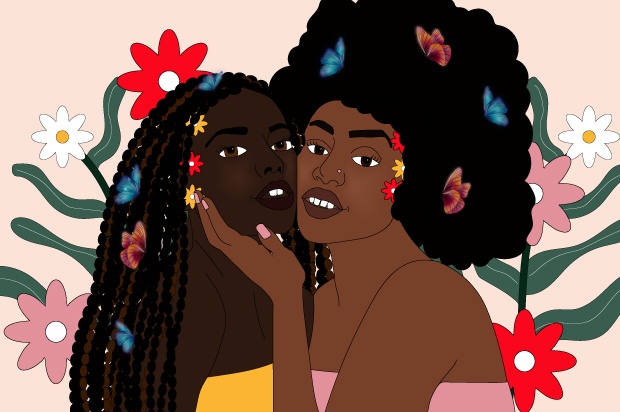Ambassador voices: Learning to love my dark skin

Why is lighter skin seen as more beautiful?
Let me preface this by saying that although I am by most opinions “not that dark,” I’ve still experienced the derogatory things that come along with having dark skin, but perhaps just in a different and less aggressive way. I urge anybody who reads this to listen to more dark-skinned people’s experiences on this topic and expose themselves to many other experiences. I now have a positive view on being dark-skinned. The disdain I felt toward myself throughout my younger years is something I unlearned and is something all of us can do once we address this.
When I was younger, I would go to bed and wish to wake up in the morning and be lighter. I knew that my skin wasn’t the ideal and it plagued me. My skin was a constant reminder that I was viewed as lesser. I feared that when people looked at me, they’d see my skin before they saw me. I now have a healthier relationship with my skin. It took me many years to free myself from the self-loathing and it only came to an end once I became aware of it.
Questioning racist beauty ideals
I had to realise this view on my skin wasn’t my own. I didn’t wake up one morning and hate my skin. No, the moment I realised that outside factors had deemed me undesirable, through centuries of preaching hate, was a huge turning point. From that point onwards I took extra note of the things surrounding me. Adverts with no dark-skinned models were no longer an inconvenience, they were a moment of reflection.
During this period, I remember walking down the aisles of my local hair shop and stopping in my tracks to stare in awe at the row of skin lighteners. I couldn’t believe it, all claiming to give you an even tone and make you brighter in appearance. They were accompanied by pictures of dark-skinned women, looking miserable before, and being transformed into lighter, happier versions of themselves.
It was hard to believe only a year prior, I was looking at those creams with astonishment, letting my imagination run wild at the thought of a lighter me. I forgave myself for only following what I thought at the time was something that I needed. I didn’t know that dark could be beautiful and how was I to know, when lighteners lined shelves in stores catered to people of colour?
Anti-dark rhetoric
After that, I couldn’t help but notice the impact of those views infecting their way into my own personal circle. The seemingly innocent pleas from friends and family for me to not stay in the sun too long, I now realised were unintentionally filled with anti-dark rhetoric, more focused on the fear of getting darker than health risks. It isn’t necessarily bad to ask me to be careful in the sun, of course not, but given the fact that those concerned remarks were followed with “you’re dark enough,” speaks volumes.
I had made it a mission to question the statement the next time someone said that. I made sure it was known that I wore sunscreen and reapplied it throughout the day. The questioning of statements such as those not only educated me but others around me. Statements like that often go unchallenged, especially in the black community, but by speaking up it made me aware that whilst mostly unintentional biases for lighter skin existed around me, I could help bring them down by just challenging them.
Learning that dark is beautiful
I thought I had made strides. I questioned colourist statements when I could, spoke about the issue openly with those around me and I was starting to see my own beauty, regardless of my darker complexion. However, it was still hard that the society we live in is only very slowly involving dark skinned people, so I had to find my own representation. As a fan of film and music I consumed media with dark skin people in roles that weren’t stereotypical, that featured stories that highlighted diverse issues.
Dark skin in film and music
For example, Moonlight (2016) is a brilliant story about the complexities of being black and LGBTQ+. I recommend that film along with Paris is Burning and Sorry to Bother You. It’s helpful to see dark-skinned characters and stories but sometimes it is just as important for dark-skinned people to just have stories and experiences outside the shade of their skin.
For music my personal favourites are Kelela, Ari Lennox and Lizzo; some wish to highlight their experience through music whilst others don’t. It’s especially important to also focus on stories instead of colour – this helped me realise even more that I am more than my shade. I have a voice, experiences and stories to share and they go deeper than a stereotype and perception.
My word of advice for anyone struggling with colourism is that self-love and acceptance is always an uphill battle. Good and bad days come and go like waves, but the most important take away is that you’re trying to be better. Acceptance in any form is hard but for an issue like this it is even harder; it’s something that takes patience and kindness toward yourself. I encourage everyone to call out colourist statements and views, and most importantly continue to rally for the representation and celebration of dark skin.
If you need support coping with racism
Read Faith Kachikondo’s self-care guide for those experiencing racism.
Read this piece by our ambassador Rachel about how to be an ally to the Black Lives Matter movement.
Read Simran’s guide to talking to your first generation parents about race.
Read about Saffron’s mission to create a black-owned vegan beauty brand.
Next Steps
- Chat about this subject on our Discussion Boards.
By Holly Turner
Updated on 09-Feb-2023
No featured article














